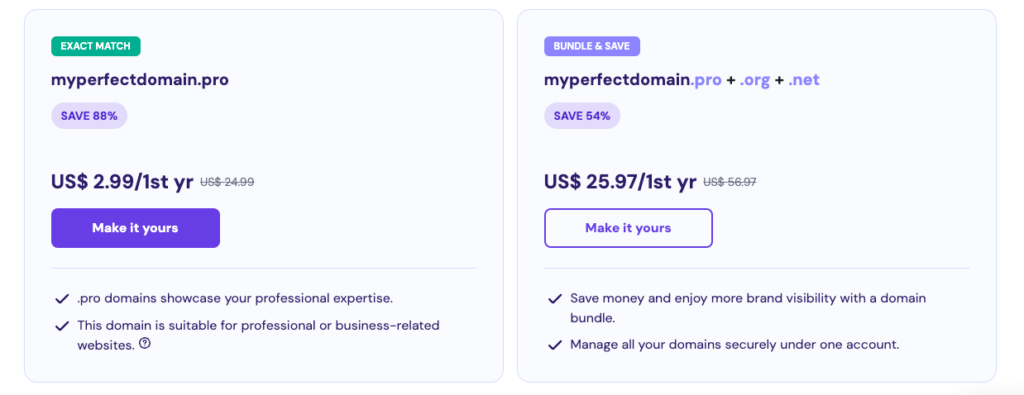Domain vs hosting: Definition and differences
When creating a website, two terms you’ll encounter immediately are “domain name” and “web hosting.” While both are essential components of any website, they serve completely different purposes.
If you think of your website as a physical house, the domain name (like example.com) would be its street address that people use to visit you.
Web hosting, on the other hand, would be the actual property where your house stands – the land and foundation that supports everything.
Without a domain name, users wouldn’t be able to find your website easily. Without hosting, your website wouldn’t have anywhere to exist on the internet.
Every functioning website requires both elements working together: a domain name (with an extension like .com, .org, or .net) and a hosting plan where all your website’s files, images, and data are stored.
Understanding the key differences between domains and hosting is crucial before you start building your website. This article explains everything you need to know about these essential website components—what they are, how they work together, and what distinguishes them from each other.

Domain names and domain registration
Let’s start with the basics – understanding what a domain name is and how to register it.
What is a domain name?
A domain name refers to the URL people type in a web browser’s address bar to access your site. Domain names provide a user-friendly way for people to navigate the internet without having to remember complex numerical IP addresses. Without domain names, users would need to use a numerical label (IP address) assigned to every website and server on the internet.
Want to learn more? Check out our detailed tutorial on how domains operate.
Domain name structure
Domain names consist of two main components:
- Top-Level Domain (TLD): The predetermined extension that follows the SLD.
- Second-Level Domain (SLD): Words or phrases that describe your website’s purpose, brand, business, or individual identity.
For example, in “google.com“, “google” is the second-level domain, while “.com” is the TLD.
How to register a domain name
To secure a domain name for your website, you must register it first. Domain registration is the process of reserving a name on the internet for a specific period. Domain licenses require renewal that is typically annual, but you can pay in advance for up to 10 years to keep the domain registered under your name.
Domain registrars and ICANN
Domain registrars are companies or organizations authorized to sell and manage domain name registrations. These registrars operate under ICANN (Internet Corporation for Assigned Names and Numbers), the global authority that coordinates and manages domain databases across the internet.
Checking domain availability
Before proceeding with domain registration, it’s crucial to verify your desired domain’s availability. At Hostinger, we offer a comprehensive domain name search tool to simplify this process.
Domain Name Checker
Instantly check domain name availability.
Our domain checker will display the availability of your chosen domain and various domain extensions with their corresponding prices.
When choosing the domain name, make sure to pick one that’s easy to remember and reflects your brand.
Types of domain extensions and pricing
Domain extensions or top-level domains (TLDs) refer to the last part of a domain name.
As the name suggests, TLDs claim the highest spot on the internet’s DNS (domain name system) hierarchy. There are hundreds of TLDs available on the web, which are maintained and regularly updated by the IANA (Internet Assigned Numbers Authority).
Domain extensions or top-level domains (TLDs) refer to the last part of a domain name.
As the name suggests, TLDs claim the highest spot on the internet’s DNS (domain name system) hierarchy. There are hundreds of TLDs available on the web, which are maintained and regularly updated by the IANA (Internet Assigned Numbers Authority).
IANA categorizes TLDs into four main categories based on their purpose and location:
1. gTLDs (Generic Top-Level Domains)
The most commonly used domain extensions as they fit various website purposes. This includes:
- .com – The most popular extension, originally for commercial websites
- .org – Traditionally used by organizations and non-profits
- .net – Initially intended for network-related sites
- .xyz, .biz, and .tech – Newer alternatives offering more flexibility
2. sTLDs (Sponsored Top-Level Domains)
These domains are restricted to certain organizations and groups. Common examples include:
- .gov for governmental sites
- .edu for educational institutions
- .post for postal services
3. ccTLDs (Country Code Top-Level Domains)
These indicate a specific territory or location using ISO country codes. For example:
4. Infrastructure Top-Level Domain
This consists of only one domain name:
- .arpa – Representing the Address and Routing Parameter Area, primarily reserved for solving internet-infrastructure issues
Ideally, your TLD should represent your website’s purpose. You can opt for general ones like .org or .com, but you can also pick from more purpose-specific ones that better reflect what your website is all about. For example:
- A .club domain works best for club websites
- With an .agency domain you can have an eye-catching name for your marketing or advertising agency
- Use .shop or .store for your ecommerce website
- An .app domain is ideal for application landing pages
- Travel agencies or blogs can benefit from a .travel TLD, etc.
If you want to register a domain name, it’s good to know all of your options to find the perfect extension. Below are just some of the domain extensions that Hostinger offers, along with their prices:
| TLD | Registration | Renewal | Transfer |
|---|---|---|---|
| .com | $9.99 | $16.99 | $9.99 |
| .co.uk | $7.99 | $11.99 | $0.99 |
| .info | $3.99 | $24.99 | $21.99 |
| .net | $14.99 | $15.99 | $14.99 |
| .xyz | $29.97 | $41.97 | $12.99 |
You can see that you can get a buy cheap domain for as little as $0.99. The offer includes some relatively new domain name extensions, such as .space, .online, and .tech. There are many more extensions to choose from that are not listed here. To check out whether the extensions you want are available, simply access our domain name checker. You might also want to check out some of the options to get a free web domain.
Once you find a suitable option, it is time to register it.
To register a domain name with Hostinger, click on the Make it yours button.

Next, select the registration period and click Continue to proceed to checkout.

Once you have bought the domain name, complete the domain registration by accessing the Home section on your hPanel and clicking the Set up button. It will direct you to the Domain Order Setup page, where you’ll be required to fill in the domain registration details.
Finally, claim your domain name’s ownership through the verification email sent to your registered email address.
Make sure to complete this process within 15 days, or your domain name will be suspended. To activate it after this period, locate the email and verify your contact information.
With Hostinger, domain privacy protection is included with the domain name your purchased, so your contact details will be hidden on WHOIS lookup tools.
What is web hosting?
A good way to define what web hosting is would be that it is service that allows you to publish a website on the internet. When you purchase hosting services from a provider, you receive allocated space on their web servers to store your website’s files and data.
Whenever someone types your website’s domain name into their browser, your web hosting provider is responsible for delivering your content to the visitor’s device.
What do web hosts provide?
In most cases, services you get when you purchase a hosting plan will include:
- User-friendly management. Web hosts provide tools that allow users to manage their websites even with minimal technical skills. This typically includes a control panel for easy site administration.
- Security protection. In addition to storing your website files, a web host protects the server and your website from malicious attacks through various security measures like firewalls and regular security updates.
- Additional services. Many web hosting companies, including Hostinger, also offer domain registration services, which we covered in the previous section. Some hosts provide tools to build a website, email hosting, and other complementary services.
- Technical support. High-quality, responsive and quick customer support is something all the best hosting providers offer, along with server maintenance, and technical assistance to help users create and maintain their sites efficiently.
How to Choose the Right Web Hosting Provider
When choosing a hosting company, consider these important factors:
- User-friendliness: Every web host provides a control panel to manage your web hosting account. Ensure the dashboard is intuitive and offers comprehensive functionality.
- Server speed and uptime: Choose a web hosting company that delivers fast loading speeds and offers an excellent uptime guarantee (99.9% or higher) to minimize your site’s downtime.
- Pricing and plans: Before purchasing a hosting plan, consider the initial costs, add-ons, and renewal fees to find an option that fits your long-term budget.
- Customer service: Select a hosting provider with a reliable support team available to provide immediate assistance when you encounter technical issues.
Hostinger utilizes LiteSpeed Web Servers to optimize our users’ website performance. Moreover, we offer a 99.9% uptime guarantee and global customer support working around the clock to guide you if you come across any technical difficulties. Feel free to visit Hostinger’s technology page to learn more about how our hosting works and what benefits it can bring to our clients.
Signing up for web hosting on Hostinger is quite easy. Just sign up using your email and pick one of the web hosting plans available. Additionally, we offer a 30-day money-back guarantee in case you are not satisfied with the service.
Types of website hosting and pricing
Now let us explore what types of hosting there are.
Hostinger offers several hosting plans suitable for anyone who wants to create a website – whether it is a personal blog or an ecommerce site. Here’s a quick overview:
- Web hosting. Starting at $2.99/month and going to $3.99/month, this is the type of hosting where multiple websites share the same physical server and have a set amount of storage and resources.
- VPS hosting. A physical server is virtually separated into multiple partitions, giving users a private environment with their dedicated resources. This hosting type works great for websites with medium-to-high traffic. VPS hosting plans range from $4.99/month to $19.99/month.
- Cloud hosting. It uses a cluster of different servers to host the website. Whenever one server experiences downtime, another server quickly steps in to keep your site running. Cloud hosting is the ideal solution for sites that need high availability, such as ecommerce stores. Prices range from $7.99 to $29.99/month. To understand what is cloud hosting, make sure to check our tutorial.
- Managed hosting for WordPress. It provides an optimized environment, performance, and security for hosting WordPress sites. This hosting plan offers WordPress-related features and customization options, so you can easily manage and grow your site. WordPress managed hosting plans range from $2.99/month to $7.99/month.
- Email hosting. A web hosting service enables you to create custom email addresses based on your domain name (e.g., janedoe@yourdomain.com). The price for email hosting plans starts from $0.59/month.
If you’re just starting out, we’d highly recommend going with web hosting first – it’s affordable, fully managed, and easy to use. You don’t need any technical background, as the Hostinger team manages every back-end technicality.
On the other hand, if you have some technical knowledge and want more control over managing a server on your own, VPS and cloud hosting are the way to go. It all comes down to your budget and what kind of website you want to build.

How a domain name and web hosting work together to create a website?
Domain names and web hosting work hand-in-hand to create a functional website. Think of it this way:
- Your domain name is like your website’s address (such as yourbusiness.com)
- Your web hosting is the actual house where your website lives
Without web hosting, your domain name would point to nothing, and your site couldn’t exist on the internet.
After purchasing a domain name, you need to point it to your web hosting provider through DNS (Domain Name System) settings. This connection tells browsers where to find your website when someone types in your domain name.
To avoid technical complications, we highly recommend purchasing your domain name and web hosting from the same provider (like Hostinger). Benefits include:
- Automatic configuration between domain and hosting
- Simplified account management
- Centralized technical support
- Time savings from not having to manually link them
Let’s briefly go over the steps of how to build a website with Hostinger:
- Pick your domain name and check its availability using the domain checker. Choose the Domain Bundle option to future-proof your branding, finalize the order, and complete the registration.
- Create an account on Hostinger and pick a suitable hosting plan for the website.
- Choose a platform to start building your site – a website builder, an ecommerce platform, or a CMS (content management system). With Hostinger, you have the option to use a site builder or popular CMSs such as WordPress, Joomla, or Drupal.
- Customize your website, upload files, and add content. Finally, when you’re ready – publish it.
Conclusion
Despite being two completely different things, many people still don’t know the difference between a domain name and web hosting. Both are essential elements of website building and serve distinct functions.
Here’s a summary of the two:
- A domain name is a string of characters that identifies a website. It is what users type in their browser to visit your site.
- Web hosting is a service that provides space on a server for your website files, allowing it to be available on the internet. When visitors access your domain name, the hosting provider transfersthose files to their web browsers.
We hope this article helped you understand the differences between domain names and web hosting and how they go hand in hand to power a website.
If you still have any questions, please let us know in the comments section below.
Domain vs hosting FAQ
Do I need web hosting if I have a domain name?
Yes. A domain name is just your website’s address, while web hosting stores all your website data and files. Without web hosting, your website is nonexistent, and your domain name would point to nowhere.
Do I need a domain if I have web hosting?
It depends, but most of the time – yes. Some web hosting providers include a subdomain name that you can use free of charge. However, these subdomains don’t make your site look professional and cannot be customized.
Do I have to buy web hosting and a domain name together?
You don’t have to buy a domain and web hosting together. However, when you buy them separately, it is necessary to change the DNS settings and point the domain to your web hosting company. Otherwise, your website will become inaccessible.
Can I transfer muy domain name over to Hostinger?
Absolutely. Visit Hostinger’s domain transfer page and enter your domain name in the provided space. Once you complete the payment, you need to insert the EPP code or domain authentication code from your current domain registrar.
Can I move my website to Hostinger?
Yes. All you need to do is upload your website files directly to Hostinger’s server through an FTP client or the File Manager of your hosting control panel. If you have no technical background, Hostinger’s support team will take care of the migration for you.
What Is domain hosting?
Domain hosting refers to services that host domain names for your website. They sell domains and register them to an owner for a specific subscription fee. It is very different from a web host, where you can purchase both a domain and a web hosting account from the same place.




Comments
December 17 2020
Thank admin, I appreciate your effort, you have quality content on your website, I have bookmarked for future pursue. Keep it up Truly decent and intriguing post. I was searching for this sort of data and delighted in perusing this one. Continue posting. A debt of gratitude is in order for sharing Usually, I never comment on blogs but your article is so convincing that I never stop myself to say something about it. You’re doing a great job Man, Keep it up. very interesting, good job and thanks for sharing such a good blog.
May 15 2022
Hi This article contains excellent definition and very useful, I really appreciate.
May 18 2022
Happy to hear it was helpful!
February 24 2024
Thanks for this article. This is educational.
February 26 2024
Hi there! Glad to hear that!